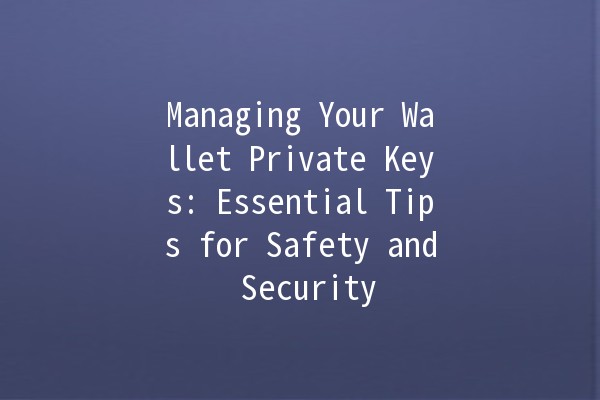
Understanding Wallet Private Keys
In the realm of cryptocurrency and blockchain technology, the concept of wallet private keys is paramount. A private key is essentially a secret number that allows you to access and manage your cryptocurrency funds. The safety of your funds heavily relies on how well you manage your private keys. Therefore, understanding private key management is crucial for both beginners and experienced users.
Importance of Secure Private Key Management
Private keys are analogous to a password for your bank account. If someone acquires your private key, they can access your funds just like you can. Therefore, it's imperative to keep them secure and private. Many users, unfortunately, fall victim to phishing attacks, malware, or simply negligence, leading to substantial financial losses.
Essential Tips for Private Key Management
One of the safest methods to store your private keys is through hardware wallets. These physical devices store your keys offline, making them nearly impervious to online threats. Unlike software wallets, hardware wallets are less susceptible to malware attacks.
Example: Consider utilizing devices like Ledger Nano S or Trezor. These wallets allow you to interact with various cryptocurrencies while keeping your private keys secure.

If you are using a software wallet or an online platform to store your keys, ensure you implement strong passwords. Combine upper and lowercase letters, numbers, and special characters. Additionally, enable twofactor authentication (2FA) for an added layer of security.
Example: If you are using an exchange like Coinbase, set up 2FA using an app like Google Authenticator. This ensures that even if someone gains access to your password, they would still require a second form of verification to access your account.
Backing up your wallet is essential in case of loss, theft, or damage. Most wallets offer backup options, where you can save your recovery phrase or seed phrase securely. Store these backups in a separate location, such as a safe or safety deposit box.
Example: When setting up a wallet like Metamask, you will receive a seed phrase. Write this down, and do not save it digitally. Store it in a waterproof, fireproof safe where it cannot be easily accessed.
Scammers continuously evolve their tactics to deceive unsuspecting users. Educating yourself on the various phishing methods will help you avoid malicious sites and emails designed to steal your private keys.
Example: Be cautious of unsolicited messages that ask you to verify your wallet information or click on suspicious links. Always verify the legitimacy of any site by checking the URL and ensuring you are on the official site.
Multisignature wallets add a layer of security by requiring multiple signatures (i.e., private keys) for a transaction to be completed. This means that even if one key is compromised, your funds remain secure.
Example: Platforms like Gnosis Safe allow you to set up multisignature wallets where you can define who has access and how many approvals are required to execute a transaction.
Common Questions about Wallet Private Key Management
Losing your private key is equivalent to losing access to your funds. If you have not backed up your wallet with a recovery phrase, you may not recover your assets. Always have a backup strategy in place.
Yes, private keys can be stolen through various methods, including phishing, malware, or physical theft. Always follow security best practices to safeguard your keys, such as using hardware wallets or storing them in secure locations.
Storing private keys on a computer, especially if it’s connected to the internet, poses significant risks. If you need to store them on a device, prefer a hardware wallet or a completely airgapped device not connected to the internet.
Your public key is like your bank account number; it can be shared with others to receive funds. Your private key, however, is akin to your bank password; it grants access to your funds and must be kept secret.
While it is not necessary to frequently change your private keys, regularly updating your passwords and securing your wallets is advisable, especially if you suspect any security breaches.
Immediately transfer your funds to a new wallet with a new private key. Make sure to secure your new wallet properly using the tips provided above.
The management of wallet private keys is an essential aspect of cryptocurrency ownership. By incorporating these strategies, you can protect your assets from unauthorized access and potential loss. Ensure you stay informed about security practices and remain vigilant against emerging threats in the rapidly evolving world of digital currencies.

